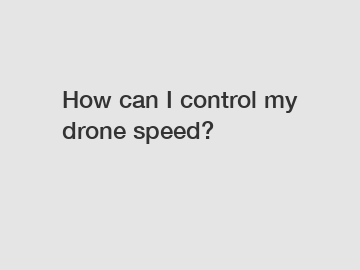How can I control my drone speed?
How Can I Control My Drone Speed?
Drones have become increasingly popular over the years, and one of the most common concerns drone pilots have is how to control the speed of their aircraft. Whether you are a beginner or an experienced pilot, having the ability to control your drone's speed is essential for capturing the perfect shots or simply having a smooth and controlled flight. In this article, we will explore some tips and techniques on how you can effectively control your drone's speed.
Understanding the Basics of Speed Control.

Before diving into the specifics, it's important to understand the basics of speed control for drones. Most drones come with preset speed modes that allow pilots to choose between different speeds such as slow, normal, and fast. However, these presets may not always suit your needs, and that's where learning to control the speed manually becomes essential.
Secondary Heading: Adjusting the Throttle.
The primary control for changing the speed of your drone is the throttle. The throttle stick on your remote control allows you to adjust the amount of power being delivered to the drone's motors, which in turn affects its speed. To increase speed, push the throttle stick forward, and to decrease speed, pull it back. It is important to note that sudden adjustments to the throttle can cause your drone to become unstable, so it's best to make gradual changes to achieve a smooth transition in speed.
Secondary Heading: Using the GPS Mode.
Most modern drones come equipped with a GPS mode, which can be a game-changer for speed control. When enabled, the GPS mode allows the drone to lock on to a specific location, enabling it to remain steady in the air even if you release the throttle stick. By using this mode, you can maintain a consistent speed without constantly adjusting the throttle.
Secondary Heading: Utilizing the Sport Mode.
If you're looking to push the limits of speed with your drone, consider using the sport mode. Sport mode is specifically designed to maximize speed and agility, allowing you to capture fast-paced shots or race your drone against other pilots. However, it's crucial to note that when using sport mode, the responsiveness of the controls will also increase, so it's essential to have good piloting skills and experience to handle the drone safely.
Secondary Heading: Wind Conditions and Flight Mode.
Another factor that affects the speed of your drone is wind conditions. Flying against strong winds can significantly reduce your drone's speed, while flying with tailwinds can increase it. Additionally, some drones come with different flight modes such as "Beginner" or "Advanced" modes. These modes can limit the maximum speed or unlock higher speeds, depending on your expertise level. Understanding these factors and adjusting your flight mode accordingly can help you maintain control over your drone's speed.
Closing paragraph:
In conclusion, mastering the control of your drone's speed is crucial for achieving the desired results during your flights. By adjusting the throttle, utilizing the GPS mode, exploring sport mode, and considering wind conditions and flight mode, you can effectively control the speed of your drone. Remember, it is always important to practice these techniques in a safe and open area, away from obstacles and people. If you have any further questions or need assistance with drone flying, feel free to contact us. Happy flying!
If you want to learn more, please visit our website glory motors, tmotor f7, tmotor 2203.5.
218
0
0

Comments
All Comments (0)